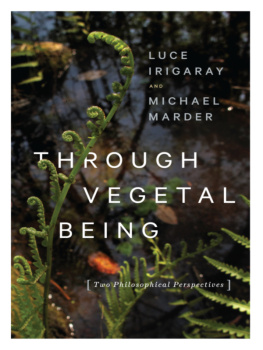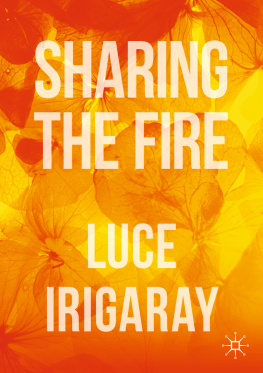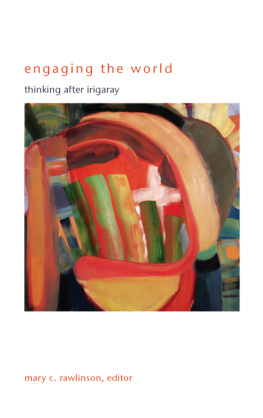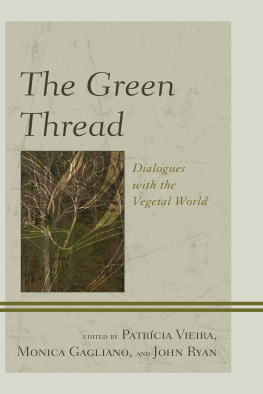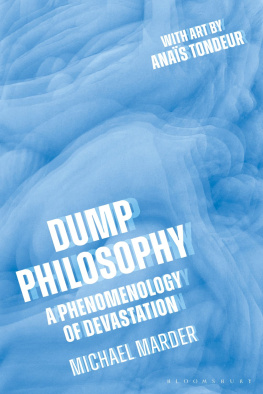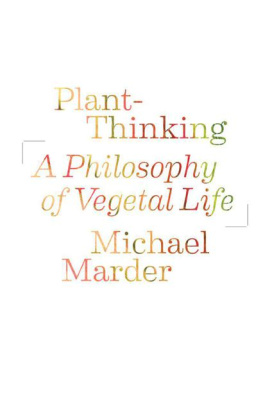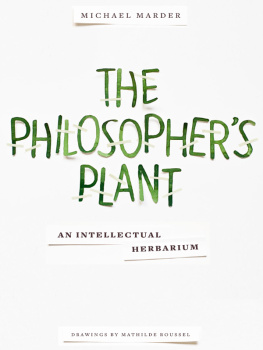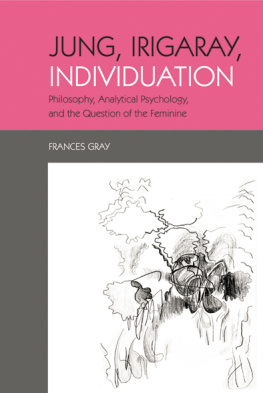Table of Contents
THROUGH
VEGETAL
BEING
CRITICAL LIFE STUDIES
CRITICAL LIFE STUDIES
JAMI WEINSTEIN, CLAIRE COLEBROOK, AND MYRA J. HIRD, SERIES EDITORS
The core concept of critical life studies strikes at the heart of the dilemma that contemporary critical theory has been circling around: namely, the negotiation of the human, its residues, a priori configurations, the persistence of humanism in structures of thought, and the figure of life as a constitutive focus for ethical, political, ontological, and epistemological questions. Despite attempts to move quickly through humanism (and organicism) to more adequate theoretical concepts, such haste has impeded the analysis of how the humanist concept life itself is preconfigured or immanent to the supposedly new conceptual leap. The Critical Life Studies series thus aims to destabilize critical theorys central figure lifeno longer should we rely upon it as the horizon of all constitutive meaning, but instead begin with life as the problematic of critical theory and its reconceptualization as the condition of possibility for thought. By reframing the notion of life criticallyoutside the orbit and primacy of the human and subversive to its organic formsthe series aims to foster a more expansive, less parochial engagement with critical theory.
THROUGH
VEGETAL
BEING
Two Philosophical Perspectives
LUCE IRIGARAY
AND
MICHAEL MARDER
Columbia University Press New York
Columbia University Press
Publishers Since 1893
New York Chichester, West Sussex
cup.columbia.edu
Copyright 2016 Columbia University Press
All rights reserved
E-ISBN 978-0-231-54151-0
Library of Congress Cataloging-in-Publication Data
Names: Irigaray, Luce, author. | Marder, Michael, 1980
Title: Through vegetal being : two philosophical perspectives /
Luce Irigaray and Michael Marder.
Description: New York : Columbia University Press, 2006. |
Series: Critical life studies | Includes bibliographical references and index.
Identifiers: LCCN 2016000987 | ISBN 9780231173865 (cloth : alk. paper) |
ISBN 9780231173872 (pbk. : alk. paper) | ISBN 9780231541510 (e-book)
Subjects: LCSH: Plants (Philosophy) | Philosophy of nature. |
Irigaray, Luce, author. | Marder, Michael, 1980
Classification: LCC B105.P535 I75 2016 | DDC 113dc23
LC record available at http://lccn.loc.gov/2016000987
A Columbia University Press E-book.
CUP would be pleased to hear about your reading experience with this e-book at .
Cover design: Evan Gaffney
Cover image: Jessica Hines, Spirit Stories # 28
References to websites (URLs) were accurate at the time of writing. Neither the author nor Columbia University Press is responsible for URLs that may have expired or changed since the manuscript was prepared.
CONTENTS
I T is our concern about the current state of nature and the living that compelled us to write a book together. If originally we imagined that it would develop from dialogues corresponding to the theme of each chapter, we quickly understood that this plan was too ambitious or not yet suitable for various reasons. Our approaches to the problem were quite different, and to distinguish our positions at theoretical, ethical, and political levels, while treating our common objective, proved to be impossible, especially given that we hardly knew and live far from one another. The dilemma was either to give up our project or to invent another presentation for the volume that suggested development toward a future dialogue. Our proposal, then, was to write a book with the text by Luce and that by Michael presented in an upside-down format, with the prospect of a meeting in the middle of the volume. Unfortunately, this suggestive solution, which inspired our way of rendering possible a dialogue while both being faithful to our perspectives, did not meet with the agreement of the publisher, especially for technical reasons. Thus it will be up to the readers to find the most fecund manner of broaching our contributions, that is, to perceive at once the main message concerning vegetal being and our different ways of dealing with it.
Without wishing to go into what will appear in our specific approaches to each theme, we can already stress some traits that differentiate our respective positions. No doubt, the two of us are grateful for the help that the vegetal world brought to our lives and continues providing us with. It is in regard to how to care for it that our analyses and proposals differ from one another. Michael thinks of the vegetal world as such and searches for the tracks of its presence in the authors of our tradition in order to provide this tradition with a new understanding and impact, and he endeavors to rebase human thinking by taking plant being into consideration. Luce, for her part, focuses more on the need to modify our conception of subjectivity in order to become able to give birth to a new way of being and existing, especially with regard to the whole living world. If the former works on the interpretation of our past philosophy by taking into consideration plant being, the importance of which has been generally neglected, the latter asks for a more radical refoundation of our culture starting from the determination, especially the sexuate determination, of our subjectivity, which allows respect for life and its development. If Michael hopes that a return to the Greek phusis would give rise to a new growth for humans, a growth immanent and close to that of plants, including at the level of sexuation, Luce is concerned that such a return be accompanied by the cultivation of human subjectivity, which cannot happen without us taking on a cut, a void, an insuperable negative and ensuring another relation to transcendence with respect to our natural environment and belonging. Whereas Michael lingers on harms and dangers that our current economy imposes on ecology, Luce reminds us of teachings of some Eastern traditions and the laws that Antigone defended as elements valid for an ecological economy that we have to take into account and develop.
These are only few aspects among those that characterize our respective positions. Blurring them through a hasty and approximative dialogue might harm the perception of our thoughts and render it impossible for readers to clear their path toward a new way of being and behaving, which the current state of our environment, of all living beings, and of our human becoming urgently requires.
Our initial proposal for the organization of the book also had the advantage of avoiding the choice between a first and a second author in the display of the volume. In the absence of such a presentation, Luce will appear as the first contributor and Michael as the second. Beyond the fact that this follows the alphabetic order of our surnames, it corresponds to the way in which the writing of the book happened most often, as the letter introducing the volume and many of the following chapters indicate.
August 2015
Dear Michael Marder,
I came to know you through your invitation to take part in the volume

